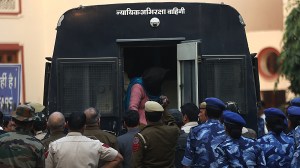Whistleblower in castration case against Ram Rahim allowed to depose via video from US
Special court allows cross-examination of key witness through video conferencing, says travel from US would cause 'extreme hardship'
 Dera Sacha Sauda chief Gurmeet Ram Rahim Singh. (File photo)
Dera Sacha Sauda chief Gurmeet Ram Rahim Singh. (File photo)A special CBI court in Panchkula has allowed the cross-examination of a key witness in the alleged forcible castration case against Dera Sacha Sauda chief Gurmeet Ram Rahim Singh to be conducted via video conferencing, observing that travel from the United States would cause “extreme inconvenience” and involve “huge expenses”.
The witness, who is also the complainant and a whistleblower in the case, is currently residing in the US. He had moved an application citing security concerns and logistical challenges in appearing physically. His request was opposed by the accused, who argued that the application was not maintainable and could prejudice his right to a fair trial.
However, Special Judicial Magistrate Anil Kumar Yadav, in an order passed Friday, said, “The present application… for permitting him to get his testimony recorded through Video Conferencing… deserves to be allowed… on the ground of long distance of more than 13,000 kms, on the ground of huge travelling expenses… and extreme inconvenience”
The complainant has alleged that he was among 400 sadhus who were forcibly castrated by Ram Rahim with the help of doctors “in the name of realization of God”. His petition to the Punjab and Haryana High Court in 2012 had led to a CBI probe and subsequent charges against Ram Rahim and two others.
The court rejected the defence’s contention that the application should have been moved by the prosecution, stating: “Even the witness does have right to move such application… in view of the case laws relied upon.”
The defence had also accused the witness of using the application as a means to secure asylum in the US and argued that he had earlier deposed without raising safety concerns. The court dismissed this as “not tenable”, noting, “Whether (the applicant) is eligible for asylum or not in USA is a matter to be decided by the US authorities.”
Noting that “courts should adopt a pragmatic approach to facilitate dispensation of justice”, the court observed, “In all cases relied upon… there has been consistent view… that… the facility of Video Conferencing should be allowed… not even a single case… has been denied… by Hon’ble Punjab & Haryana High Court or… Supreme Court of India.”
To facilitate the cross-examination, the court directed the CBI’s investigating officer to coordinate with the Ministry of External Affairs and the Indian Consulate in the US “to ensure availability of a secure place” for deposition. The court also asked the CBI to provide a document visualizer and equipment to preserve the audio-visual testimony.
The court clarified that the defence will have to submit documents to be used during cross-examination one day in advance and prepare their questionnaires beforehand, in line with the procedure laid down by the High Court in Parminder Singh vs Sukhminder Singh.
“Inconvenience caused to the defence counsel in putting the documents… pales in comparison to the inconvenience caused to the witness in coming from USA… incurring huge traveling expenses,” the court said.
The next date of hearing will be fixed after coordination with the Indian Consulate, the order said.







